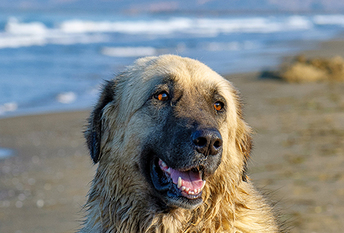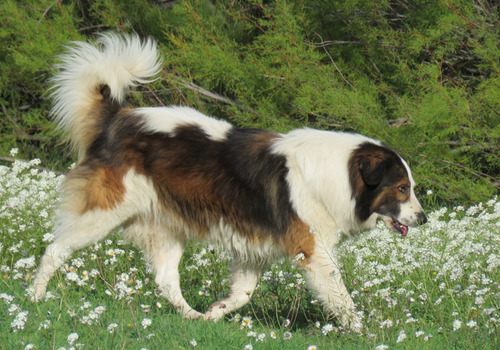Beyond regular weekly grooming, the occasional bath will keep your Tornjak clean and looking his best. Grooming can be a wonderful bonding experience for you and your dog.
The strong, fast-growing nails should be trimmed regularly with a nail clipper or grinder to avoid overgrowth, splitting, and cracking. The ears should be checked regularly to avoid a buildup of wax and debris, which can result in infection. Teeth should be brushed regularly.
The Tornjak is not very demanding in terms of exercise – he will do well with a long daily walk and plenty of play time, especially with other dogs. Options for exercise include playtime in the backyard, preferably fenced, or walks several times a day.
Exercise can also come in the form of indoor activities, like hide-and-seek, chasing a ball rolled along the floor, or learning new tricks. Certain outdoor activities like swimming, hiking, or retrieving balls or flying discs can provide a good outlet for expending energy.
If you live in an apartment, even short walks in the hallways can give your dog some exercise, especially during inclement weather. Training for dog sports like agility, obedience, and rally can also be a great way to give your dog exercise.
As a large-breed dog, the Tornjak requires a high-quality dog food diet that has been formulated for large-breed dogs. During the breed’s development it was commonly underfed. As a result, the modern Tornjak has fairly low needs for protein – a high-protein diet can actually lead to health problems.
Any diet should be appropriate to the dog’s age (puppy, adult, or senior). Some dogs are prone to gettingoverweight, so watch your dog’s calorie consumption and weight level.Treatscan be an important aid in training, but giving too many can cause obesity.
Learn about whichhuman foodsare safe for dogs, and which are not. Check with your vet if you have any concerns about your dog’s weight or diet.Clean, fresh water should be available at all times.
Some dogs may be faced with health challenges in their lives, but the majority of Tornjaks are healthy dogs. Working with a responsible breeder, prospective owners can gain the education they need to learn about specific health concerns within the breed.
The Tornjak is most commonly used for herding and protecting livestock, so he can be trained for either of these purposes. This breed is intelligent and decisive so a firm and consistent hand in training is recommended to keep the dog from becoming willful. Tornjaks are quick to learn and they do not forget things quickly, so you are only likely to need a few repetitions when training.











